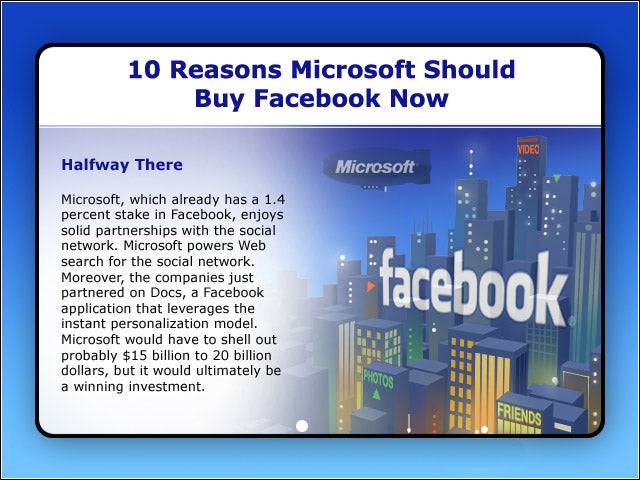eWEEK content and product recommendations are editorially independent. We may make money when you click on links to our partners. Learn More.
2Microsoft Is Adrift Online
Microsoft’s online business has lost billions of dollars. Its Bing search engine, the new focal point of its online endeavors, has rallied to almost 12 percent share in 11 months. But Google continues to mop the floor with all search comers, commanding 65 percent of the search market.
3Facebook Is a Social Superpower
With close to 500 million users, Facebook boasts the largest social network in the world. Microsoft has struggled in the social sphere. Microsoft points to MSN as a heavily trafficked social site, but it’s more of a news portal than a social network. Grabbing Facebook, which lets users upload links, photos and videos and share them with users, would give Microsoft instant market share and credibility in this space.
4Get Facebook at Googles Expense
Despite Google’s best efforts and intentions with Google Buzz, the search giant, like Microsoft, remains on the outside looking in for the social Web. If Microsoft were to grab Facebook it would give the software giant a major piece of the Internet puzzle, giving Microsoft the upper hand on Google for a change.
5Facebook Is a Rising Power in Search
Researcherssaid search queries on Facebook grew from 395 million in January 2010 to 436 million in February 2010, a growth of 10 percent. With hundreds of millions of users spending 20 minutes or more on Facebook each day, it’s no shock that these users are doing searches to navigate the social network. Buying Facebook would enable Microsoft to catch more users looking to share and search.
6This Means More Search for Bing
7Where There Is Search, There Are Ads
Forrester Research analyst Augie Ray told eWEEK: “A combination of Facebook and a search engine or ad network would create a very interesting opportunity to share more relevant advertising to searchers or surfers based not just on search or surfing history but also consumers true interests as expressed via Facebook Likes, applications, groups, games and other activities.” Of course, Facebook and Microsoft would have to negotiate privacy hurdles.
8Facebooks Future
Facebook is branching out, letting Websites add a Like button to create information-sharing tunnels between themselves and Facebook. Facebook’s instant personalization takes this third-party integration further. When users are logged into Facebook, participating Websites can personalize users’ experience using your public Facebook information, suggesting music or other goods and services. If this succeeds, it could lead to a number of targeted advertising capabilities for Facebook and Microsoft, should it buy the social network.
9Facebook Social Ads
Facebook has not publicly described how it plans to monetize the Like buttons and instant personalization, but this move clearly paves the way for a new advertising paradigm. Because Google doesn’t yet have a bead on the social Web, let alone social ads, Microsoft would do well to buy Facebook now and propel the social network into the new ad opportunities.
10Halfway There
Microsoft, which already has a 1.4 percent stake in Facebook, enjoys solid partnerships with the social network. Microsoft powers Web search for the social network. Moreover, the companies just partnered on Docs, a Facebook application that leverages the instant personalization model. Microsoft would have to shell out probably $15 billion to 20 billion dollars, but it would ultimately be a winning investment.
11The Bottom Line
Microsoft’s archenemies are Google and Apple. Facebook is the ultimate weapon to combat both rivals, as blogger Mark Cuban noted: “Facebook knows more than all of us like to admit about its users. They have our personal information, our pictures, our friends, our family members, our employers and business associates all in a database and they are extending that information base to what we like on sites outside the Facebook platform. Plus they are creating their own currency. Just as important is the fact that we are progressively spending more time on Facebook than we are sites and applications that Apple and Google can control. That is a threat to Apple and Google.”










